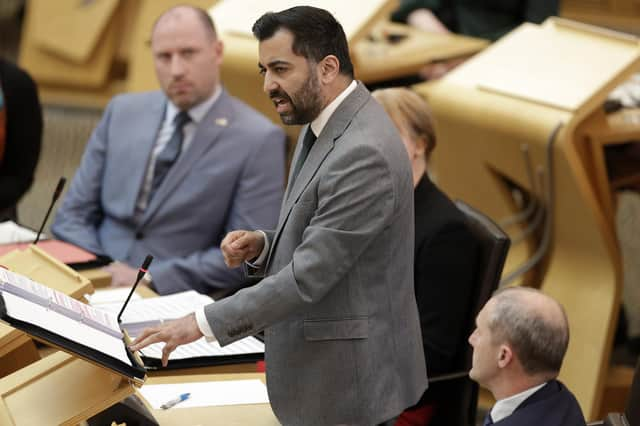Euan McColm: Single-judge trials won't bring much-needed justice for rape victims


On several occasions, at the request of Bell’s defence lawyer, Lindsay was obliged to hold up the g-string knickers she’d been wearing at the time of the attack. She was instructed to read out the words written on them, “Little Devil”.
Having been brutally violated, Lindsay was humiliated as she gave evidence.
Advertisement
Hide AdAdvertisement
Hide AdThree weeks after her attacker was found guilty, Lindsay took her own life. She was 17.
Lindsay’s experience seemed to encapsulate everything that was wrong with the way victims of sex crimes experienced the justice system. Senior politicians promised things would change.
Twenty-one years on from Lindsay’s death, victims of rape and other sexual assaults are entitled, still, to have little faith in the law. In 2020-21, police received reports of 2,176 rapes and attempted rapes, yet there were only 152 prosecutions resulting in just 78 convictions. That’s a conviction rate of 51 per cent compared with an overall rate of 91 per cent.
So, we find ourselves, once again, at a point when politicians promise things will change.
First Minister Humza Yousaf recently pointed to a “weight of evidence: that juries are affected by ‘rape myths and misconceptions’”. This is a concern shared by Justice Secretary Angela Constance.
This, I think, is an entirely legitimate worry. If you have not, over the years, heard – even in “polite” company – views of the “she was asking for trouble” and “what did she expect?” variety then I suspect you are in the minority.
On top of that, the nature of the crime of rape brings other problems for prosecutors. There are, for example, unlikely to be witnesses. DNA evidence may be argued away as the result of consensual sex. More often than not, things come down to one person’s word against another’s.
So, yes, the argument for a change to the way rape is prosecuted is compelling.
Advertisement
Hide AdAdvertisement
Hide AdBut that doesn’t. I’m afraid, mean a simple solution presents itself.
The Scottish Government recently announced that – under the Victims, Witnesses and Justice Reform (Scotland) Bill – it would pilot juryless rape trials. In a bid to tackle low conviction rates, such cases would be heard before a single judge.
This proposal wasn’t cooked up by MSPs with no experience of the law. Rather, it came from Lady Dorrian, the second most senior judge in Scotland.
Yet, despite the credentials of the woman proposing the pilot scheme, it has been rejected by lawyers across the country.
Stuart Murray, vice president of the Scottish Solicitors Bar Association, reports that lawyers will join in an almost unanimous boycott of the scheme. At last count, seven bar associations – representing lawyers across the country – have decided not to back the juryless trials experiment.
Murray describes the Scottish Government’s plan as "a knee-jerk reaction… a blatant attempt to increase conviction rates” and argues that, though failings exist in the way rape cases are dealt with, the solution must not be the removal of the right to be judged by a jury of one's peers.
A counter argument is made by Sandy Brindley, chief executive of Rape Crisis Scotland. Quite reasonably, she asks that we have a system where we may be “confident that the evidence being heard in rape trials is being assessed fairly and objectively and isn't influenced by false assumptions or attitudes towards women”. Everyone, adds Brindley, has the right to a fair trial but that doesn’t automatically mean a jury trial. “A single-judge trial,” she adds, “is still a fair trial.”
Few people know as well as Brindley how devastating a crime rape is. She has spent decades working with others to help victims deal with its lifelong impact.
Advertisement
Hide AdAdvertisement
Hide AdBut questions linger. Is a single-judge trial really still a fair trial? The Scottish Government argues that a number of crimes are already tried without juries. But these are offences of a minor nature, such as shoplifting. If it is fair to remove juries in rape cases, shouldn’t we remove them in murder trials? If justice requires a jury of one's peers in the case of one serious crime, why doesn’t it in the case of another?
A lawyers’ boycott of the pilot scheme is likely to put an end to it before it begins. It’s hard, after all, to see how it could proceed without the participation of defence teams.
This would be an entirely unsatisfactory outcome for those – like Sandy Brindley – who see the need for change. But it is hard to argue that some serious crimes should be heard before juries and others should not. The system may be flawed – perhaps, in large part, because the humans who make up juries are flawed – but it must offer equality of justice for those accused of committing crimes.
Of course, we should wish to see an improvement in the conviction rate for rape and other serious sexual offences. We are also entitled to think that police and prosecutors can and should do more to see that reported crimes end up forming the bases of court cases.
But this can’t be achieved by manipulating the system. If the Scottish Government finds a way of proceeding with the pilot of juryless rape trials, we will soon see claims – under human rights legislation – that those convicted did not receive fair treatment. We will hear the argument that a two-tier justice system is in operation. Those arguments will carry some weight.
This “fix” stands to create chaos.
More than two decades after Lindsay Armstrong’s death, it’s still not clear how justice for rape victims can be improved.